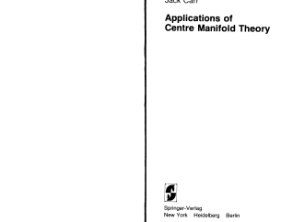Springer, 1981. - 142 pages.
These notes are based on a series of lectures given in the Lefschetz Center for Dynamical Systems in the Division of Applied Mathematics at Brown University during the academic year 1978-79.
The purpose of the lectures was to give an introduction to the applications of centre manifold theory to differential equations. Most of the material is presented in an informal fashion, by means of worked examples in the hope that this clarifies the use of centre manifold theory.
The main application of centre manifold theory given in these notes is to dynamic bifurcation theory. Dynamic bifurcation theory is conceed with topological changes in the nature of the solutions of differential equations as parameters are varied. Such an example is the creation of periodic orbits from an equilibrium point as a parameter crosses a critical value. In certain circumstances, the application of centre manifold theory reduces the dimension of the system under investigation. In this respect the centre manifold theory plays the same role for dynamic problems as the Liapunov-Schmitt procedure plays for the analysis of static solutions. Our use of centre manifold theory in bifurcation problems follows that of Ruelle and Takens [57] and of Marsden and McCracken [51].
These notes are based on a series of lectures given in the Lefschetz Center for Dynamical Systems in the Division of Applied Mathematics at Brown University during the academic year 1978-79.
The purpose of the lectures was to give an introduction to the applications of centre manifold theory to differential equations. Most of the material is presented in an informal fashion, by means of worked examples in the hope that this clarifies the use of centre manifold theory.
The main application of centre manifold theory given in these notes is to dynamic bifurcation theory. Dynamic bifurcation theory is conceed with topological changes in the nature of the solutions of differential equations as parameters are varied. Such an example is the creation of periodic orbits from an equilibrium point as a parameter crosses a critical value. In certain circumstances, the application of centre manifold theory reduces the dimension of the system under investigation. In this respect the centre manifold theory plays the same role for dynamic problems as the Liapunov-Schmitt procedure plays for the analysis of static solutions. Our use of centre manifold theory in bifurcation problems follows that of Ruelle and Takens [57] and of Marsden and McCracken [51].

